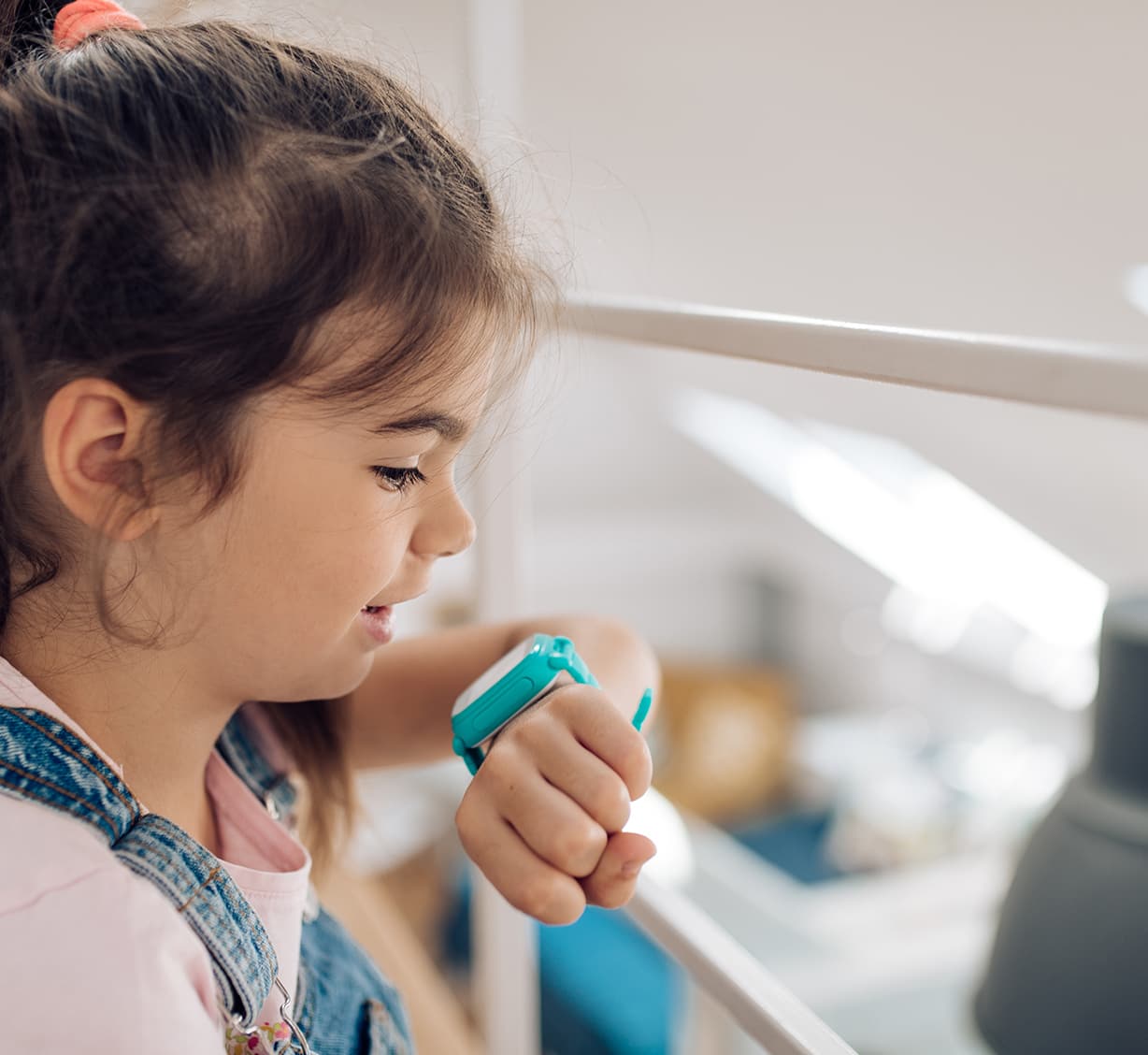AT&T Wireless℠
How to choose a phone, smartwatch, or tablet for kids
Whether you're looking for a device for a child for schoolwork, entertainment, or to keep them connected and safe when they're on the go, there're several factors you'll want to consider when choosing a device for your child. For example, you'll want to know what features to look for, how to tell if your kid is ready for a device, and whether it's best to go with a phone, smartwatch, or tablet.
If you're reading this, you're likely facing the crossroads many parents eventually come to when buying a device for their kids. If you're asking questions like "Is my kid ready for a device?", "What kind of device do they need?" or "How much will all this cost me?", you've come to the right place. Let's break it down and start with the basics.
Info at a glance
- Is my child ready for a device?
- Things to consider when choosing a device for your child
- Is it good for kids to have a tablet?
- What to look for in a cell phone for your child
- How can I manage my child's screen time?
- How much do phones cost for kids?
- Is a smartwatch for kids worth it?
- Smartwatch advantages over a smartphone
Is my child ready for a device?
Addressing if your child is ready for a device is perhaps even more important than considering which device to choose. To help you decide if you and your child are ready for mobile life, take our PhoneReady Quiz. The 10-question quiz helps parents assess their child's behaviors, developmental maturity, and their family's values to calculate one of three scores (Ready Zone; Almost Ready Zone; and Not Yet Ready Zone).
Knowing that your kid has a device they can easily access can give you peace of mind, but some challenges come with digital life. Developing a healthy relationship with technology starts with the responsible use of their first device. To help set your child up for success, you can also make your own Family Media Plan to encourage media balance and set goals and rules about technology use that are right for your family.

|
Things to consider when choosing a device for your child
|
What to look for in a cell phone for your child
Here are some of the key features you should consider when buying a cell phone for your child:
- Features
If you're buying your child's first cell phone to keep in case of emergencies, then you won't need a smartphone with all the bells and whistles. In fact, a "dumb phone" or a basic flip phone might be more appropriate. They're user-friendly and perfect for those that don't need the extra tech, fast internet speeds, or distractions. Although they can connect to the internet with these devices, navigation can be slow and clunky.
- Parental control options
On many smart devices, you can install parental control and safety apps like AT&T Secure Family to keep tabs on your child's device, manage their screen time, track their location, get alerts when they enter/leave locations (like school zones), block or limit internet access, and even filter inappropriate apps and websites by age range.
- Durability
Accidents happen, especially with kids. Whatever device you get for your child, you'll want to protect it from damage. You can add extra safeguards like an insurance policy in case of device damage and mishaps, including broken, stolen, or lost phones. Chances are your kid will put their first device through the wringer. For everyday wear and tear, you'll want to buy a rugged phone case, and pick up a screen protector to reduce the likelihood of a screen crack when the device is dropped on the ground.
So, you've decided you're finally comfortable getting your child their first phone. Congratulations! That's a huge step for both of you. The next part is figuring out which phone to choose and how much it will cost—both upfront and for the monthly wireless service. You can search for inexpensive kid phones, specifically if price matters most to you, or you can search by features. For example, if you only need basic calling for emergencies, choosing a smartphone with the biggest memory and fastest processor may not make much sense. You'll also need to think about what wireless plan you'll connect their device to so that they have service. If you're a current AT&T Wireless customer, you may be able to simply add a line to your existing wireless plan. Another low-budget option is getting a classic flip phone with a prepaid plan for your kid to use in emergencies.
Pricing of cell phones for kids varies depending on the type of device and additional features available and usually starts around $80. At the bottom of the price range, you'll get simple models which let you communicate with your child but won't have internet access, parental controls, or GPS features. A more expensive device will have many more features and internet access but may cost you upwards of $700.
If you think your kid is responsible and ready for a smartphone, you can explore popular phones like Apple iPhone 13, Apple iPhone 12, Samsung Galaxy A14, or Samsung Galaxy S21 FE. They're durable and have access to the internet and apps—but you can still monitor them when you activate parental controls.
Is it good for kids to have a tablet?
Tablets and kids are a great match across several age groups—starting with toddlers, tweens, and more responsible teenagers. Tablets could be an excellent fit for younger kids in particular. Why? Because these devices can take a beating. They're also lightweight, portable, and the touchscreen interfaces are easy to learn and interact with. They're also versatile and can be used both for entertainment and school homework and even more creative tasks.
Most tablets are also cheaper than laptop computers and much more durable. The main factors to consider when looking for a kid's tablet are age and maturity level. When you're looking for the best tablet for your kid, prioritize durability and price—particularly when they're younger and tend to be less careful with their devices. You can always install educational and other apps on your child's tablet to enhance their experience—while maintaining supervision through parental control settings to have visibility into what type of content they access. Tablets are easy to use and great for both entertainment and educational apps. With the right apps and supervision, tablets can be an excellent way for kids to keep themselves preoccupied productively. Check out this article on how to pick a tablet for kids. Whether you're buying your child a tablet so they can be preoccupied, or you've noticed that your kid is showing interest in new hobbies like drawing, you can add accessories like a stylus to help exercise their creativity. And if you want some of the capability of a laptop without having to upgrade your child's tablet, consider adding a keyboard folio for when your kid wants to do homework or to stand the tablet up instead of holding it in their hands. As a bonus, the folio will also act as a lightweight cover to protect your device.
Once your child shows they're responsible or have outgrown their "kid-friendly" tablet, it's time to consider upgrading their device to a higher-end tablet. These will be more expensive, but there're still many great deals you can take advantage of.
Is a smartwatch for kids worth it?
For some parents, a good starter phone might not be a phone at all. Like riding a bike, you might start with training wheels and monitor how your child handles basic devices, their ability to interact responsibly with technology, screen time, and the rules you've laid out. A smartwatch may be the "training wheels" you're looking for when shopping for your kids' first device.
Encourage kids to use their phone or smartwatch as expected by positioning it as a way to prove themselves and their readiness for a smartphone or tablet. This will align their goals with yours. We recommend starting with a smartwatch if you want basic communication with your child. Then, when they've shown themselves to be more responsible, consider giving them a tablet. And ultimately, a smartphone is the final step when they (and you) are ready for it. The investment and price ranges will also increase as the devices become more complex.

Smartwatch advantages over a smartphone
Kids' smartwatches are built for simple communication between parents and child, rather than for kids to communicate with friends or engage with apps. Like a tiny computer on your child's wrist, smartwatches allow your child to send texts and make calls—though these calls will be less private because they're limited to communicating on speakerphone. With smartwatches, you can also keep tabs on your kid by tracking their location via GPS. And with some watches, parents can even set up alerts to trigger when your child leaves a particular location, like their school.
With a smartwatch, there's also less concern about screen time since the small screen and the lack of a keyboard make it far less likely that they'll be chatting on their watch all day. As children demonstrate their responsibility with a smartwatch, you may be ready to transition them to an adult phone.